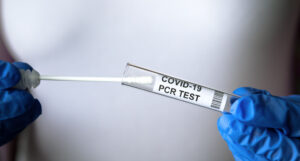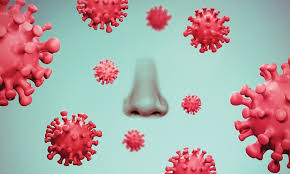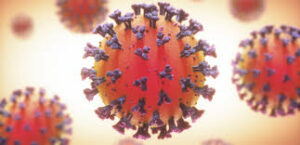Kala duwanaanshaha Sigma – calaamadaha welwelka leh ee kala duwanaansho cusub oo walaac ah oo ka imanaysa Ururka Caafimaadka Adduunka oo u muuqda inay ka baxsanayaan ilaalinta tallaalka.
Omicron Variant – Covid 19 Kala duwanaansho cusub oo walaac ah
Omicron Variant – Kala duwanaanshuhu wuxuu leeyahay tiro badan oo isbeddello ah, kuwaas oo qaarkood yihiin “ku saabsan” ayuu yiri Ururka Caafimaadka Adduunka (Hay'ada Caafimaadka Aduunka).
Caddaynta hordhaca ah waxay soo jeedinaysaa khatarta sii kordheysa ee dib-u-qaadista kala duwanaanshahan, marka la barbardhigo kuwa kale Noocyada Covid.
Tirada kiisaska kala duwanaanshahan ayaa u muuqda inay sii kordhayaan ku dhawaad dhammaan gobollada Koonfur Afrika halkaasoo markii hore lagu aqoonsaday.
Kala duwanaanshaha B.1.1.529 ayaa markii ugu horreysay lagu wargeliyay WHO oo ka timid Koonfur Afrika 24 Nofeembar 2021.
Soo bixitaanka lama filaanka ah ee nooc cusub - oo ay magacawday omicron ee Ururka Caafimaadka Adduunka (Hay'ada Caafimaadka Aduunka) - waxa ay kicisay xasuus ilaa jiilaalkii hore, markii ugu horeysay ee dunida lagu wargeliyay wax cusub, Qaabka fayraska ah ee la kala qaadi karo, kala duwanaanshaha Delta.
Nooca ugu badan ee COVID-19 ayaa diiradda saaray ka hortagga
1. Omicron wuu ka faafi badan yahay noocyada kale ee fayraska.
2. Dadka aan la tallaalin ayaa halis ku jira.
3. Kala duwanaanshaha Omicron wuxuu u horseedi karaa ' dillaaca hyperlocal.'
4. Weli waxaa jira wax badan oo laga baran karo Kala duwanaanshahan.
5. Tallaalku waa difaaca ugu wanaagsan ee looga hortagayo noocyada Covid ee soo ifbaxaya
Tijaabooyinka gaarka loo leeyahay ee Covid-19 PCR Fit Fit Travel Travel Abroad
Taam u Duulidda Tijaabada London – Tijaabada PCR waxaa bixiya kilinigyo badan oo London Harley Street ah iyo bixiyeyaasha caafimaadka ee Covid 19.
Qaar badan oo ka mid ah xarumaha Harley St ayaa bixiya Imtixaan si loo sii daayo & PCR waxay ku tijaabisaa Shahaadada 'Fit to Fly' ee socdaalka iyo shaqada caalamiga ah, oo leh natiijooyin degdeg ah oo sax ah.
Tijaabooyinku caadiyan waa baaritaan bukaan-socod oo uu sameeyo dhakhtar.
Haddii aad damacsan tahay inaad u safarto wakhti firaaqo ah, shaqo ama ujeeddooyin waxbarasho, markaas waxaad u baahan tahay imtixaan.
Marka baaritaanka la dhammeeyo oo natiijada la xaqiijiyo, waxaad heli doontaa shahaadada ku haboon iyo koodka QR ee xaqiijinaya xaaladaada fayow ee safarkaaga.

Waxaa jira baaritaano kala duwan oo aad ku hubin karto inaad qabtid coronavirus (COVID 19). Tijaabada aad u baahan tahay waxay ku xidhan tahay sababta laguu baaro.
The 2 imtixaanada ugu waaweyn waa:
- PCR - badiba dadka calaamadaha leh, waxa loo diraa shaybaadhka si loo hubiyo
- Tijaabooyinka socodka lateral ee degdega ah - kaliya dadka aan lahayn calaamadaha, waxay bixiyaan natiijo degdeg ah iyagoo isticmaalaya qalab la mid ah baaritaanka uurka
Waa maxay baaritaanka PCR?
falcelin silsilad polymerase ah (PCR) tijaabo ayaa la sameeyaa si loo ogaado walxaha hidde-sidaha ee noole gaar ah, sida fayraska. Baaritaanku wuxuu ogaanayaa jiritaanka fayras haddii aad qaadsiisay waqtiga baaritaanka. Tijaabadu waxay sidoo kale ogaan kartaa jajabyada fayraska xitaa ka dib markaad hadda qaaddo.
Maxay PCR u taagan tahay?
Falcelinta Silsiladda Polymerase (PCR)
Sida guriga loogu sameeyo baaritaanka PCR
Haddii aad leedahay calaamadaha coronavirus (COVID 19) Waa in aad isla markiiba go'doomiso oo aad ka qabsataa baaritaanka PCR rugta caafimaadka Harley Street ee kuugu dhow.
Waxaa laga yaabaa inaad awood u yeelatid inaad hesho baaritaanka PCR si aad guriga ugu sameyso, iyadoo ku xiran helitaanka
Maxaa ku jira xirmada tijaabada PCR?
Qalabka baaritaanka guriga waxaa ku jira:
- suuf
- fijaan ay ku jiraan qadar yar oo dareere ah - tani waa inay ku sii jirtaa tuubada
- bac sib-quful cad ah oo leh suuf wax nuugaya
- boorso leh koodka QR
- 3 dhejisyo
- sanduuq
Ku habboon in la duulo Tijaabi Imtixaannada Safarka London
Tijaabooyinka safarka ee Covid-19 ayaa loo baahan yahay haddii aad u duuleyso dibadda. Caadi ahaan kuwani waa falcelinta silsiladda polymerase (PCR) imtixaanada.
Fadlan hubi liiska tijaabiyeyaal dawladu ansixisay.
Intee in le'eg ayay qaadanaysaa in aan helo natiijooyinka baaritaanka COVID-19?
Immisa ayay tahay Qiimaha Tijaabada PCR?
Kharashyadu way kala duwan yihiin laakiin caadi ahaan inta u dhaxaysa £60 ilaa £250 waxay ku xidhan tahay bixiyaha aad doorato.
ETA Variant Covid 19 Fayruuska corona
Kala duwanaanshaha Eta aad buu u faafayaa
Laga bilaabo Sebtembar 2021 ku dhawaad 70% Bukaannada UCL ee laga helay COVID-19 waxay lahaayeen nooca Eta.
Sida laga soo xigtay UCL isla toddobaadkan, kala duwanaanshaha Episilon ayaa xisaabiyey in ka badan 80% kiisaska cusub ee Maraykanka. Khubarada caafimaadku waxay sheegaan inay caado u tahay in nooc cusub oo fayras ah uu aad u faafo maxaa yeelay badiyaa wuxuu noqdaa mid aad waxtar u leh oo si fudud loo kala qaado.
Bulshooyinka leh heerar tallaal oo hooseeya, gaar ahaan dhulka miyiga ah ee daryeelkoodu kooban yahay, Kala duwanaanshaha Eta wuxuu noqon karaa mid aad u dhaawac badan. Tan waxaa horay loogu arkay adduunka oo dhan wadamo faqiir ah oo tallaalka COVID-19 uusan ahayn mid la heli karo. Khubarada caafimaadku waxay sheegeen in saamaynta la dareemi karo tobanaan sano ee soo socda.
Nooca ugu badan ee COVID-19 ayaa diiradda saaray ka hortagga.
Laga soo bilaabo waxa aan ognahay meeshan, Dadka sida buuxda looga tallaalay cudurka 'coronavirus' waxay sii wadaan inay leeyihiin difaac adag oo ka dhan ah COVID-19 marka la barbardhigo kuwa aan ahayn, in kasta oo UCL ay ku talinayso taxadar dheeraad ah oo ay ku jiraan tilmaamaha waji-xidhka haddii lagu tallaalay iyo in kale.
" Kiisaska horumarsan,"halkaas oo dadka si buuxda loo tallaalay ay ka helaan COVID-19, ayaa weli loo arkaa naadir, xataa Eta, sida uu sheegay xisbiga UCL, laakiin haddii qof la tallaalay uu cudurka qaado, waxay gudbin karaan fayraska. (UCL waxay sii wadaysaa inay qiimeyso xogta haddii dadka qaba kiisas horumarsan oo aan lahayn astaamo ay faafin karaan fayraska.)
Halkan waxaa ah shan shay oo aad u baahan tahay inaad ka ogaato kala duwanaanshaha Eta.
1. Eta way ka faafi badan tahay noocyada kale ee fayraska.
2. Dadka aan la tallaalin ayaa halis ku jira.
3. Eta waxay u horseedi kartaa dillaaca 'hyperlocal'.’
4. Weli waxaa jira wax badan oo laga baran karo Eta Variant.
5. Tallaalku waa difaaca ugu fiican ee ka hortagga Eta Variant.
Waxa ugu muhiimsan ee aad samayn karto si aad naftaada uga ilaaliso UCL waa inaad si buuxda u tallaalan, Dhakhaatiirtu waxay yiraahdeen. Halkaa marka ay marayso, Taas macnaheedu waa haddii aad qaadato tallaalka laba-dose sida Pfizer ama Moderna, tusaale ahaan, waa in aad labada irbado ka dibna aad sugto muddada lagu taliyey ee labada toddobaad ah si ay tallaaladaas u dhaqan galaan.
Waa muhiim in taas la xasuusto, halka tallaaladu ay yihiin kuwo aad waxtar u leh, ma bixiyaan 100% ilaalinta, si dad badan loo tallaalo, waxaa jiri kara kiisas horudhac ah oo badan, UCL ayaa yidhi. Iyadoo ay jireen xaalado horumar leh oo isbitaal la dhigey, Dhammaan tallaallada ayaa weli bixiya difaaca ugu fiican ee jirro daran, isbitaal dhigis iyo dhimasho, wakaaladu waxay tiri.
Dadka si buuxda loo tallaalay waxay qaadsiin karaan kuwa kale, Laakin UCL waxay kaloo soo warineysaa in xadiga walxaha hidde-sidaha fayraska laga yaabo inuu si dhakhso leh hoos ugu dhaco dadka la tallaalay Epsilon Variant-sidaas, halka la ogaaday in ay sanka iyo dhuunta ku sitaan fayraska sida dadka aan la tallaalin, Daraasado ayaa sidoo kale lagu ogaaday inay faafin karaan fayraska waqti ka yar kuwa aan la tallaalin.
Haddii lagu tallaalay iyo haddii kale, Waxa kale oo muhiim ah in la raaco tilmaamaha ka hortagga UCL ee diyaar u ah dadka la tallaalay iyo kuwa aan la tallaalin. Iyadoo ay socdaan dadaallada lagu tallaalayo dad badan oo ku nool U.S., UCL waxay ku talinaysaa "xeeladaha ka hortagga lakabka leh,” oo ay ku jirto xidhashada maaskaro wajiga marka lagu jiro goobaha dadweynaha ee gudaha meelaha la taaban karo ama sareeyo, haddii lagu tallaalo iyo haddii kale. Wakaaladu waxay sidoo kale ku talisay indho-shareerka guud ee gudaha dhammaan macalimiinta, shaqaalaha, ardayda, iyo booqdayaasha dugsiyada K-12.
"Sida wax walba oo nolosha ah, tani waa qiimaynta halista socota,” ayuu yiri Dr. Smith. "Haddii ay qorraxdu tahay oo aad dibadda ahaan doonto, waxaad xidhataa muraayada qorraxda. Haddi aad ku sugan tahay goob dad badan isugu yimi, laga yaabo inay la jiraan dad aan la tallaalin, waxaad xidhataa maaskaro oo waxaad ilaalisaa fogaynta bulshada. Haddii aadan tallaalin oo aad xaq u leedahay tallaalka, waxa ugu fiican ee aad samayn karto waa in aad is tallaalto."


